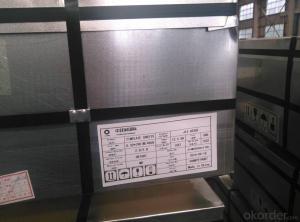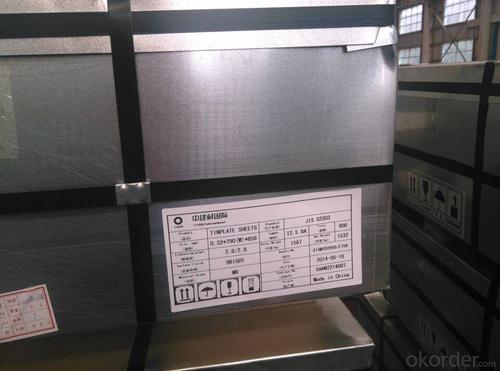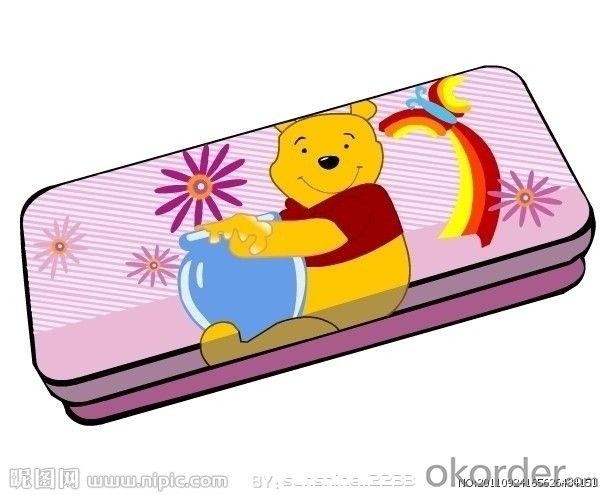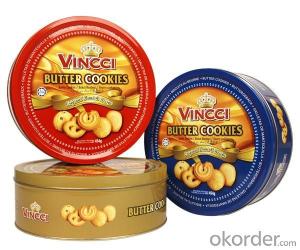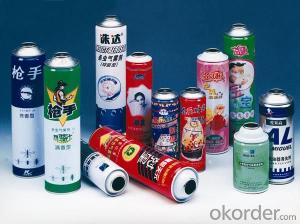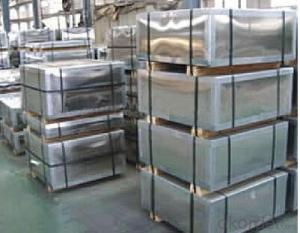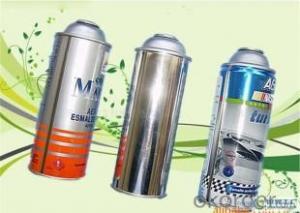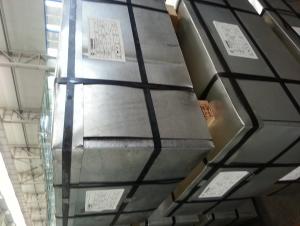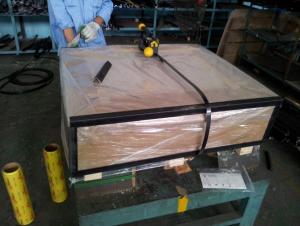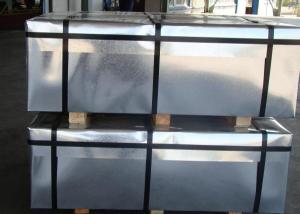MR Material Tinplate For Aerosol Cans, Paint Cans
- Loading Port:
- Tianjin
- Payment Terms:
- TT OR LC
- Min Order Qty:
- 25 m.t.
- Supply Capability:
- 40000 m.t./month
OKorder Service Pledge
OKorder Financial Service
You Might Also Like
1. Specification
standard: GB/T2520, JIS G3303, DIN EN10202
Material: MR /SPCC
Thickness available: 0.16-0.50MM
Width available: 600~1050MM
Temper grade: T1 – DR8
Tin coating: ordinary 2.8g/2.8g, 5.6g/5.6g and others
Package: sea worthy export package.
2. Usage
Tinplate is widely used for making all types of containers, containing industrial usage such as paint can, oil can, aerosol cans etc., and food cans like milk powder cans, tomato paste can, dry food cans etc.
3. Our factory photo & equipments

4. Our Overseas Markets:
Our tinplate has been exported to more than 50 countries, quality be approved and welcome by all of our customers. Furthermore, in the year 2014, we have more than 10 overseas warehouses all over the word, located in KSA, UAE, Oman, Russia, Kuwait, Qatar, Oman, Chile, Brazil etc.
5. FAQ
a. what's the annual output?
about 500,000 tons per year.
b. where's the raw matrial from?
our hot rolled coil is purchased from Capital Steel and other state owned mill, with quite good quality.
c. how long is the delivery time?
normally for SPCC about 45~55 days, while 65~75 days for MR material
d. how to control the quality during production process?
inside our workshop, we have MES syestem. It realizes the optimization of the production procedure in the workshop. It could record each step of the whole production procedures, and if some problem appears, factory could easily found and take action, it’s quite helpful to monitor and control the quality.
- Q: How is tinplate coated for electrical enclosures?
- Tinplate is commonly coated for electrical enclosures through an electroplating process, where a thin layer of tin is deposited onto the surface of the base metal. This electroplating process helps to enhance the corrosion resistance and conductivity of the tinplate, making it suitable for use in electrical enclosures.
- Q: What are the different ways to store tinplate containers?
- There are several ways to store tinplate containers, depending on the available space and the specific needs of the items being stored. Some common storage methods include stacking the containers on shelves or pallets, placing them in storage bins or crates, hanging them on hooks or racks, or arranging them in storage cabinets or drawers. The chosen method should ensure easy access, proper organization, and minimal risk of damage to the containers.
- Q: What are the different ways to label tinplate packaging?
- There are several ways to label tinplate packaging, including using adhesive labels, direct printing on the surface, embossing or debossing the tinplate, or using lithography to transfer a design onto the packaging.
- Q: What are the common closure systems for tinplate containers?
- The common closure systems for tinplate containers include twist-off caps, screw caps, and press-on lids.
- Q: What are the advantages of using tinplate for automotive parts?
- Tinplate offers several advantages for automotive parts. Firstly, it provides excellent corrosion resistance, making it ideal for parts exposed to harsh environmental conditions. Additionally, tinplate offers good formability, allowing for complex shapes and designs, providing flexibility in manufacturing. It also offers high strength and durability, ensuring long-lasting performance and safety. Furthermore, tinplate is lightweight, contributing to improved fuel efficiency and reduced emissions. Lastly, it is a cost-effective material, providing value for money in automotive part production.
- Q: Is tinplate safe for contact with skin?
- Yes, tinplate is generally safe for contact with skin. It is a widely used material in the production of various products, including jewelry, cosmetic containers, and packaging. Tinplate is known for its durability and resistance to corrosion, making it suitable for direct contact with the skin without causing any harmful effects. However, if you have a known allergy or sensitivity to tin or metals, it is recommended to avoid prolonged or direct contact with tinplate to prevent any potential skin irritation.
- Q: What are the main applications of tinplate in the aerosol industry?
- The main applications of tinplate in the aerosol industry include the production of aerosol cans, which are widely used for packaging and dispensing various products such as paints, lubricants, insecticides, and personal care items. Tinplate cans provide excellent barrier properties against moisture, gases, and light, ensuring the integrity and shelf life of the aerosol products. Additionally, tinplate's high strength and durability make it ideal for withstanding the pressure and handling requirements of aerosol packaging.
- Q: Cookies with tinplate packaging has what advantage
- Tinplate has obvious superiority compared with other packaging materials.
- Q: What are the main challenges in recycling tinplate?
- The main challenges in recycling tinplate include the separation of tin from the steel base, the removal of any contaminants or coatings on the tinplate, and ensuring the proper sorting and collection of tinplate waste to prevent it from ending up in landfills. Additionally, the energy-intensive process of melting and refining tinplate poses environmental concerns and requires adequate infrastructure for recycling facilities.
- Q: What are the typical tooling costs for tinplate production?
- The typical tooling costs for tinplate production can vary depending on factors such as the complexity of the design, size of the production run, and specific requirements. However, on average, tooling costs for tinplate production can range from a few thousand dollars to tens of thousands of dollars.
Send your message to us
MR Material Tinplate For Aerosol Cans, Paint Cans
- Loading Port:
- Tianjin
- Payment Terms:
- TT OR LC
- Min Order Qty:
- 25 m.t.
- Supply Capability:
- 40000 m.t./month
OKorder Service Pledge
OKorder Financial Service
Similar products
Hot products
Hot Searches
Related keywords
